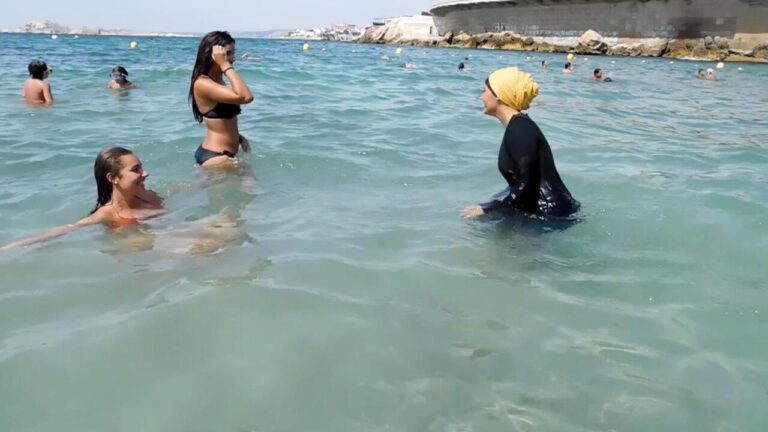In a contentious clash between local governance and national policy, the French government is set to contest the decision made by the city of Grenoble to permit burkinisŌĆömodest swimwear designed for womenŌĆöin public swimming pools. This move, which has ignited fierce debate surrounding secularism and personal freedoms in France, underscores the ongoing tensions between cultural expression and state regulations in one of EuropeŌĆÖs most storied republics. As Grenoble seeks to promote inclusivity and accessibility in its public facilities, critics argue that such measures challenge France’s secular values and adherence to a strictly enforced dress code in public spaces. The outcome of this legal challenge could have significant implications for similar initiatives across the country, as debates on secularism, identity, and community continue to echo throughout the nation.
France’s Legal Response to Grenoble’s Burkini Policy
France’s government has announced plans to legally contest the recent decision by Grenoble to permit the wearing of burkinis in public swimming pools. This move highlights the ongoing tensions between local municipalities and national policies regarding secularism and religious expression. The burkini, a full-body swimsuit designed for Muslim women, has sparked heated debates over its implications for France’s la├»cit├®, the principle of secularism deeply rooted in French society. Authorities argue that admitting such attire in public spaces undermines the country’s commitment to secular values.
The legal challenge is poised to reignite discussions around cultural integration and individual freedoms in France. Supporters of the burkini policy contend that it promotes inclusivity and respects the rights of religious minorities, while opponents maintain that it contradicts the principles of secularism. Key points in this debate include:
- Secularism vs. Personal Freedom: The balance between upholding secular values and allowing personal choices.
- Social Cohesion: Concerns that the allowance of religious attire in public spaces may lead to societal divisions.
- Public Sentiment: Varying opinions among the populace regarding the acceptance of diverse cultural practices.
Public Sentiment and Cultural Implications of the Burkini Debate
The debate surrounding the burkini in France has unveiled profound public sentiment shaped by both cultural and political tides. Proponents argue that allowing burkinis in public pools fosters inclusivity and recognizes the diverse fabric of French society. They see it as a step towards embracing personal freedom and religious expression, particularly for Muslim women who wish to swim without compromising their beliefs. However, critics contend that the burkini symbolizes a capitulation to extremist ideologies, perceiving its acceptance as a threat to FranceŌĆÖs secular values. This polarized view highlights the ongoing struggle between individual rights and national identity.
To analyze these contrasting perspectives, we can consider a few cultural implications:
- Integration vs. Rejection: The burkini debate questions whether French secularism can truly accommodate diverse cultural practices.
- Public Spaces as Reflection: Public pools are seen as microcosms of broader societal attitudes towards multiculturalism.
- Media Influence: Coverage of the burkini debate often shapes public opinion, framing it as a symbol of larger ideological conflicts.
| Perspective | Support | Opposition |
|---|---|---|
| Social Inclusion | Recognizes diversity | Destabilizes secular values |
| Religious Freedom | Empowers women | Encourages extremism |
| Public Health | Encourages swimming | Perceived safety concerns |
The Intersection of Secularism and Personal Freedom in France
The decision by Grenoble to permit burkinis in public swimming pools has reignited a heated debate regarding the balance between secularism and personal freedom in France. Advocates for the burkini assert that it symbolizes individual choice and inclusivity, arguing that women should have the right to enjoy public amenities without compromising their beliefs. They raise concerns that banning such swimwear may infringe upon personal liberties and disproportionately affect Muslim women, restricting their engagement in public life. Critics of the decision, however, contend that allowing such attire in pools undermines France’s staunch secular principles, arguing that religious symbols and attire should be kept out of state-operated spaces.
This clash of ideologies raises pressing questions about the role of the state in personal expression and religious practice. While France prides itself on its secular values, the complexities of modern multiculturalism challenge the traditional interpretations of these principles. The government’s upcoming legal challenges to Grenoble’s policy will be pivotal in determining whether the right to personal expression will be prioritized over the need for a secular public space. Key considerations include:
- Historical Context: The roots of French secularism.
- WomenŌĆÖs Rights: Empowerment vs. restriction.
- Public Order: Safety and community standards.
Recommendations for Future Regulations on Swimwear in Public Spaces
As debates over swimwear regulations in public spaces intensify, municipalities must consider a balanced approach that respects individual freedoms while ensuring public safety and inclusivity. Recommendations for future regulations may include:
- Clear Definitions: Establish explicit guidelines on acceptable swimwear to prevent ambiguity and promote understanding among diverse cultural groups.
- Consultation with Communities: Engage with local communities to understand their needs and values, ensuring that regulations reflect the demographics served.
- Trial Periods: Implement temporary pilot programs to assess the impact of new swimwear policies and gather feedback for future adjustments.
- Educational Campaigns: Launch initiatives to inform the public about new regulations, fostering a culture of acceptance and awareness.
In addition to these strategies, comparative analysis of swimwear regulations in other countries may provide valuable insights. A proposed framework is illustrated in the table below:
| Country | Regulation Focus | Community Feedback Mechanism |
|---|---|---|
| France | Inclusive options for religious attire | Public forums and surveys |
| Australia | Health and safety standards | Community advisory committees |
| Canada | Promotion of diversity | Focus groups with cultural representatives |
In Retrospect
In conclusion, the French governmentŌĆÖs decision to challenge Grenoble’s allowance of burkinis in public pools reflects ongoing tensions surrounding secularism and religious expression in France. As the debate intensifies, the implications extend beyond the cityŌĆÖs aquatic facilities to broader conversations about cultural identity and integration in a nation historically defined by its commitment to la├»cit├®. With a court ruling expected, both sides remain poised to argue their cases, highlighting the deep divisions that persist within French society. As public sentiment flares and protests unfold, the outcome could set a crucial precedent for how France navigates the complex intersection of religion, culture, and public life in the years to come.




